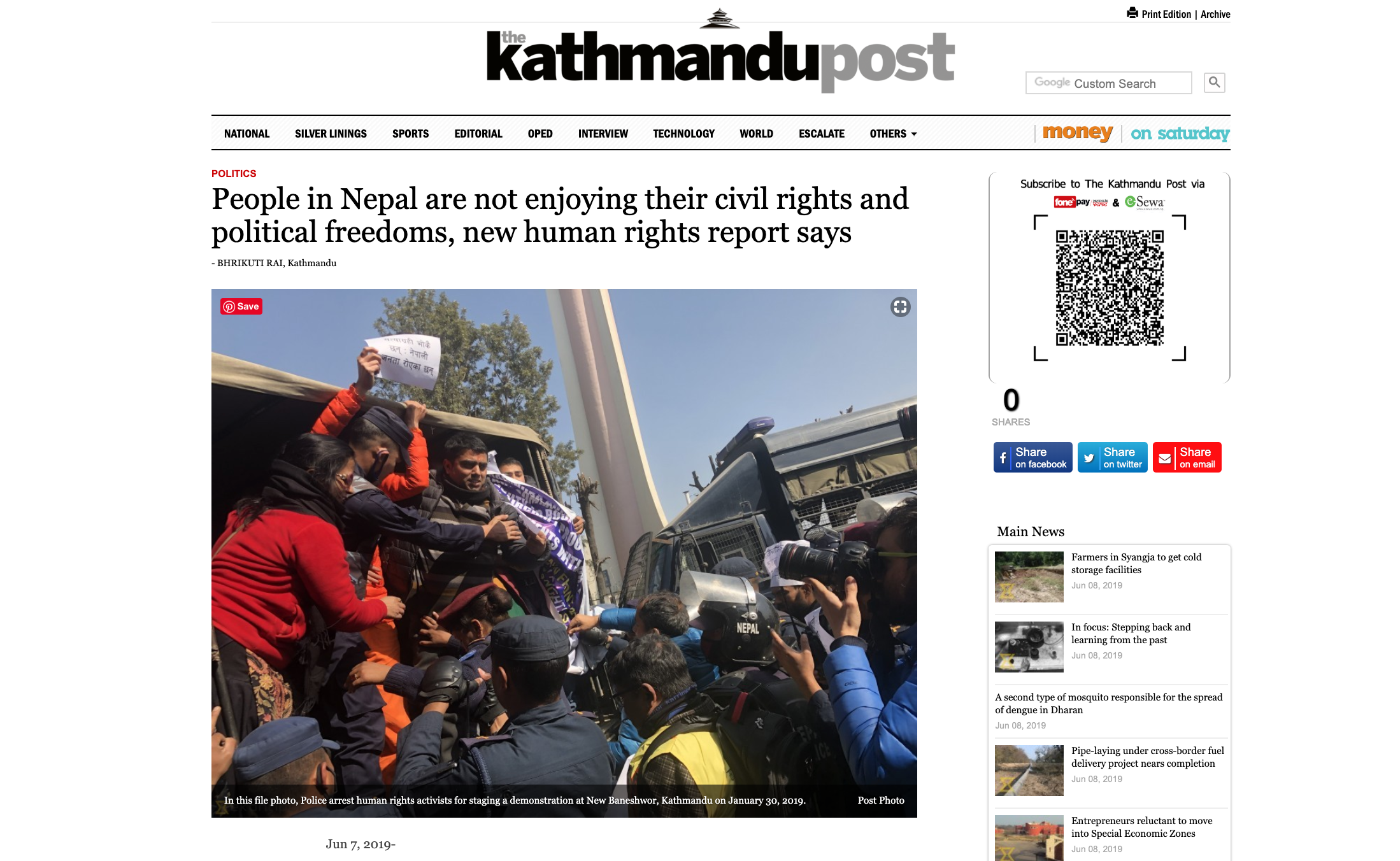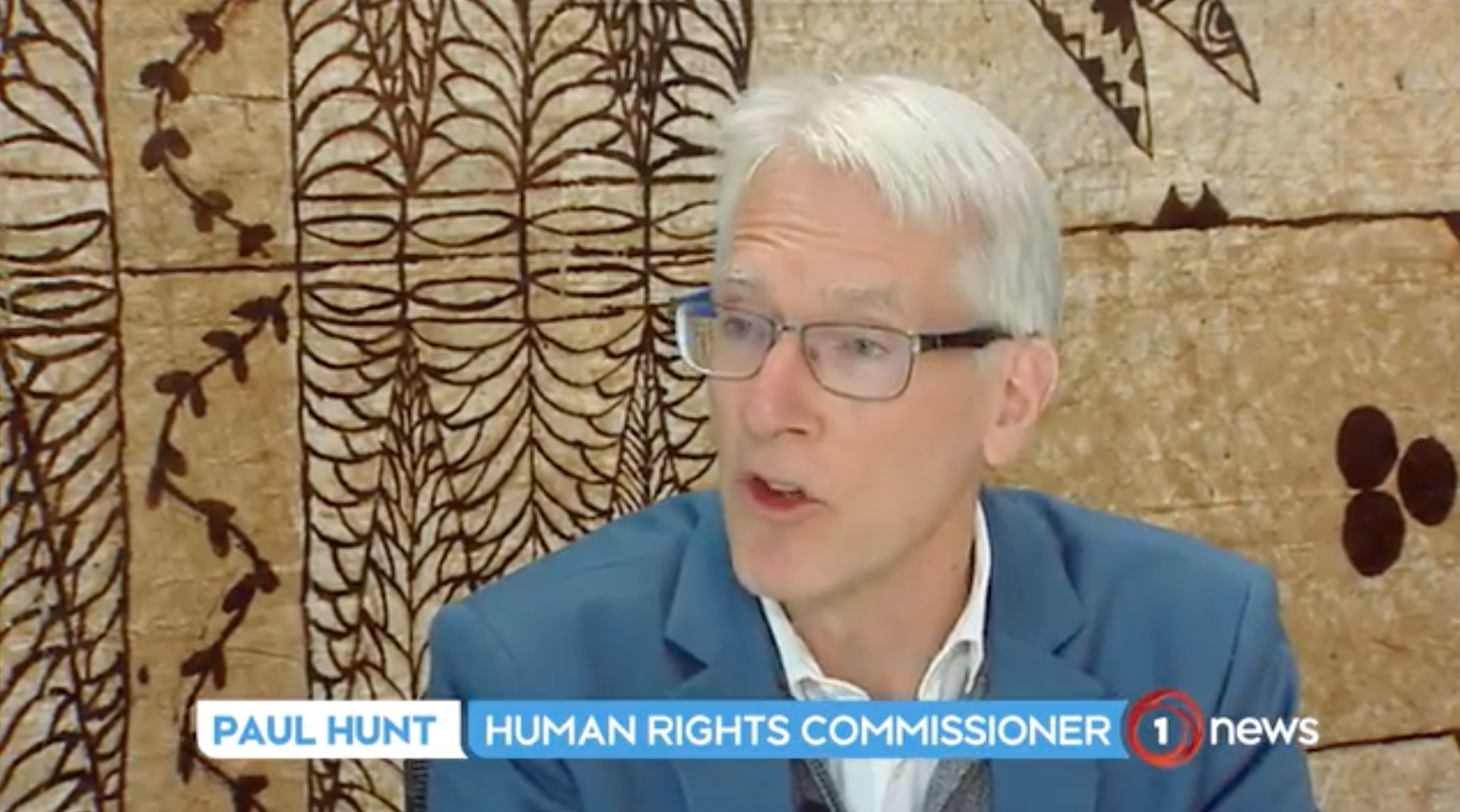Dados de direitos humanos na mídia
2023
Seia Ualesi discussed HRMI’s 2023 Pacific region data, for Radio Samoa.
Gabrielle Pickard-Whitehead reported on Amnesty International’s protest repression map, citing the UK‘s low scores.
Magali Alvarez reported on Mexico‘s forced disappearance performance for the Yucatan Times.
Aerolyne Reed wrote about Vietnam‘s human rights performance for the Vietnamese Magazine.
Michael Tomasky wrote about China‘s human rights ranking for The New Republic.
Aliran wrote about Malaysia‘s civil society organisations calling on the government to abolish whipping as penal punishment.
Rigoberto Lobo wrote about Venezuela’s human rights for El Post+.
The Middle East Eye wrote about Saudi Arabia‘s sportswashing.
Ade Adesomoju wrote about Nigeria for Premium Times.
Justice Malala wrote about South Africa and the BRICS for the Financial Mail.
Lawrence J Haas wrote about China’s scores in this article about the United States foreign policy, for The Messenger.
RFA discussed Hong Kong and China’s scores in this news segment.
胡思頻道 did an in-depth overview of Hong Kong’s HRMI scores in this video, in Cantonese.
香港元宇宙 discussed China and Hong Kong’s human rights scores in this video, in Cantonese.
GG Channel commented on China and Hong Kong’s scores in this video, in Cantonese.
NTD News covered China‘s human rights performance in this segment of China in Focus.
Anish Chand wrote about Fiji’s human rights scores for the Fiji Times.
The CFHK wrote about Hong Kong‘s Justice Minister’s comments about freedom of assembly in their top news roundup.
Jennifer Jett wrote about Hong Kong‘s human rights performance for NBC News.

Te Ao Tapatahi spoke to JustSpeak’s Apiphany Forward-Taua about Māori people’s rights violations in Aotearoa New Zealand for Māori+ TV.
Waatea News wrote about civil and political rights violations of Māori people in Aotearoa New Zealand.
The Africa Brief wrote about Malawi‘s struggle to meet its economic and social rights benchmarks.
The Taipei Times wrote about Taiwan and South Korea‘s human rights performance in Asia.
Voice of Tibet wrote about China’s human rights violations.
Gaonkelog wrote about India‘s poor human rights performance in South Asia.
The Epoch Times wrote about Hong Kong‘s low empowerment scores.
The Hong Kong Free Press wrote about Hong Kong‘s empowerment scores and the Justice Minister’s comments on assembly and association.

The Human Rights Law Centre wrote about Australia‘s human rights failings.
VOA Vietnamese wrote about China‘s civil and political rights oppression.
RFA wrote about China’s low empowerment ranking among our sample.
The China Digital Times wrote about China‘s low ranking on civil and political rights.
RNZ discussed Aotearoa New Zealand‘s human rights obligations.
Dat Viet wrote about Vietnam‘s human rights performance.
The News Minute wrote about India and Bangladesh‘s arbitrary arrest scores.
Malay Mail wrote about refugees, immigrants, and Indian people’s right to freedom from torture in Malaysia.
Stuff NZ wrote about the civil and political rights of Māori people in Aotearoa New Zealand.
Wenxue city wrote about China‘s civil and political rights performance.
The Chaser News wrote about China and Hong Kong‘s human rights scores.
The Brazilian Report wrote about declining human rights scores in Brazil.
Stuff NZ wrote about Aotearoa NZ failing to meet its human rights obligations.
VOA Cantonese wrote about China‘s low civil and political human rights scores.
Premium Times Nigeria wrote about Nigeria‘s human rights performance compared to neighbouring countries.
Malay Mail wrote about Malaysia‘s economic and social rights performance.
Malay Mail wrote about empowerment rights in Malaysia.
Malay Mail wrote about the rights of refugees, immigrants, and homeless people in Malaysia.
Follow Up Stories wrote about India‘s crackdown on protests.
The Epoch Times wrote about China‘s human rights scores.
Amy Hawkins wrote about China‘s scores, including freedom of religion and belief, for the Guardian.

Liberty Times Net wrote about China’s human rights performance in 2022.
Segun Ojo wrote about Nigeria‘s economic and social rights scores in relation to poverty, for The Star.
Mike Gunzelman wrote about Saudi Arabia‘s position in the sports world for OutKick.
Radio Free Europe Radio Liberty wrote about Romania‘s teacher’s strike.
Punch Newspaper wrote about extrajudicial killings in Nigeria.
Paul Fein cited HRMI’s Saudi Arabia scores in a Sportstar article about tennis in 2022.
Pitamber Kaushik wrote about India’s oil & gas imports, citing the country’s poor human rights record, for the Asia Times.
Oketoyin Dorcas Adenike wrote about Nigeria’s health rights and practices for Sabilaw.
Anne-Marie Brook and Kobe Amos wrote about the unique nature of HRMI data for the Loop.
Augusto Zimmerman wrote about the UK government’s human rights performance for Quadrant Online.
Stephen Bagwell and Willow Kreutzer wrote about women’s rights in Turkey, following the 2023 earthquakes.
Harley Clarke wrote about torture and ill-treatment in the UK for North East Bylines.
Ameh Ejekwonyilo wrote about Nigeria‘s human rights situation in light of presidential elections, for Premium Times Nigeria.
Peter Lee wrote about Saudi Arabia’s human rights record in the Hong Kong Free Press, in coverage of a diplomatic visit in Hong Kong.
In the Epoch Times, Anne Zhang and Olivia Li drew on HRMI data in reporting on human rights abuses in Hong Kong.
This Sportstar article on the best sports moments of 2022 used HRMI data to call out Saudi Arabian sportswashing.
Pitamber Kaushik wrote in the Asia Times about Saudi Arabia’s human rights record in the context of India’s petroleum supply chain.
Nilratan Halder wrote about Bangladesh‘s health scores for The Financial Express.
Anish Chand wrote about Fiji‘s cultural rights scores for The Fiji Times.
Anish Chand also wrote about the impacts of the climate crisis on human rights in Fiji for The Fiji Times.
The China Digital Times covered HRMI’s scores for Hong Kong in this article.
2022
Stuart Fraser wrote about Cameron Norrie and Saudi Arabia’s sportswashing in The Times.
Genc Mlloja wrote about Albania‘s education scores for Albanian Daily News.
Laxmi Mohan Kumar wrote about education in India for The Logical Indian.
International Views published this article about human rights and Covid-19.
Al Williams wrote about the Cook Islands data for The Cook Islands News.
The Scottish Alliance for Children’s Rights Together wrote about HRMI’s scores for monitoring the UNCRC.
Anish Chand wrote about Fiji‘s Quality of Life performance for the Fiji Times.
The Tribune India wrote about India‘s 2022 UPR recommendations (link no longer available).
Laraib Farhat wrote about India‘s role in the UN Security Council and the Universal Periodic Review’s impacts, for Geopolitical Monitor.
Anish Chand wrote about Fiji‘s low empowerment scores for the Fiji Times.
Together, the Scottish Alliance for Children’s Rights, wrote about the UK‘s HRMI scores.
Shobha Warrier wrote about India‘s worsening human rights situation for Rediff.
Hanna McCallum wrote about the impact of colonisation on human rights in Aotearoa New Zealand for Stuff.
Aotearoa New Zealand’s Green Party published a press release about Indigenous Self-determination in the country.
Sialai Sarafina Sanerivi wrote about Samoa‘s mixed human rights scores for the Samoa Observer.
Bruna Fontes wrote about Brazil‘s falling freedom of expression scores under Bolsonaro for The Loop.
Marty Logan interviewed HRMI’s Stephen Bagwell about human rights data for Inter Press Service’s podcast STRIVE.
Jan Kohout wrote about HRMI’s Pacific region data for RNZ.
Caleb Fotheringham wrote about the Cook Islands’ human rights violations towards LGBTQIA+, children, and people with disabilities for Cook Island News.
Oliver Fiala, Elizabeth Kaletski, and Annie Watson wrote about children’s rights and the need for better data, for the Loop.
Sharon Muriuki wrote about economic and social rights for the Kenya School of Law newsletter.
Pablo Santos-Pineda wrote about El Salvador’s education policies and performance, relying on HRMI data, for the Loop.
RFA wrote about Hong Kong’s plummeting empowerment scores and journalistic freedom.
Tory Shepherd writes about a Hong Kong billboard in Australia ignoring the human rights violations for The Guardian.

Judd Birdsall interviews David Griffiths about freedom of religion and belief for Berkley’s Religion & Diplomacy.
Eduardo Burkle wrote about the challenges and importance of measuring human rights, looking at HRMI’s work, for The Loop.
The Cosmopolitan Globalist wrote about freedom of expression in Hong Kong in their Global Eyes commentary, citing HRMI.
The 88 Project reported on Vietnam’s low scores for civil and political rights in their newsletter.
Doug Bandow wrote about China’s influence on Hong Kong’s declining Safety from the State scores, for Acton Institute.
Joshua Cooper interviewed HRMI’s Susan Randolph and Mariam Rasheed about economic and social rights in the Pacific, for Think Tech Hawaii.
Neha Bhatt wrote about Indian authorities’ ‘bulldozer justice’ practices, citing the country’s low Safety from the State scores, for The Globe and Mail.
Prajasakti wrote about HRMI’s human rights measurements in this article.
Katya Yegorov-Crate wrote about our human rights scores for Cultural Survival’s website.
Time.News wrote about India’s low civil rights scores in this article.
Jenny Lei Ravelo and Amruta Byatnal listed the best-performing countries based on income-adjusted right to health scores for Devex’ Checkup.
Laura Walters wrote about inequalities in New Zealand‘s education system for Stuff NZ, citing our people at risk data on the right to education.
Ashley Cornell wrote about the changes in Hong Kong since 1997, citing the country’s plunging civil and political rights scores for Spam Chronicles.
André Duchesne wrote about Hong Kong’s history since 1997, citing the country’s empowerment score for La Presse.
Tiziano Marino wrote about the erosion of rights in Hong Kong, citing the people at risk data for the right to assembly and association for Tag 43.
National Affairs looked at India’s worse than average performance in this YouTube video demonstration.
Ella Hopkins wrote about declining political freedom in the UK for Each Other, relying on HRMI data.
Asia Society wrote this explainer about Hong Kong marking its 25th anniversary.
Banned Book published this article about Hong Kong’s HRMI’s scores.
The Washington Post published this article by HRMI team members about the erosion of human rights in Hong Kong.

John Bishop cited New Zealand’s HRMI scores in an article about the country’s struggling economy.
The Edge Telugu reported on India’s HRMI scores.
The China Digital Times wrote about Hong Kong’s low empowerment scores.
The Wire wrote an article about India’s low HRMI scores.
The National Endowment for Democracy wrote about Hong Kong’s low empowerment scores, comparing them to China’s.
The Vietnamese included the new HRMI scores for Vietnam in its weekly round-up.
ABC’s Pacific Beat programme speaks to HRMI’s Thalia Kehoe Rowden about the Pacific region’s high human rights scores among the sample of countries measured.
ANI News wrote about Hong Kong’s decreasing human rights scores over the last few years.
The Vietnamese wrote a detailed article about Vietnam’s HRMI scores, looking at each category of rights individually.
Cook Islands News wrote about the Cook Island’s high scores on civil and political rights.
Radio Free Asia wrote about Vietnam’s poor but improving human rights scores in English and in tiếng Việt (Vietnamese).
Radio Free Asia wrote about the decrease in Hong Kong’s human rights scores in recent years.
Voice of America News wrote about Hong Kong’s low human rights scores and ranking among our sample of countries.
Premium Times wrote about Nigeria’s low ranking among Sub-Saharan Africa on economic and social rights scores.
Laura Walters reported on New Zealand’s Justice Minister’s comments on the country’s low HRMI scores, defending the Government’s work on human rights.
Jenny Lei Ravelo wrote about HRMI’s right to health scores across the globe, speaking to HRMI co-founder Susan Randolph for Devex.
Sup China included The Guardian’s article about Hong Kong’s dropping civil and political rights scores in their daily round-up.
Commons Hong Kong reported on Hong Kong’s drop in civil and political rights scores in recent years.
Bernard Hickey reported on New Zealand’s human rights scores in his daily round-up of news for The Kākā.
Helen Davidson wrote in The Guardian about Hong Kong’s civil and political rights scores significantly decreasing, comparing them to China’s scores.

Ryan Ho Kilpatrick interviews HRMI’s Thalia Kehoe Rowden about Taiwan’s human rights scores in 2022, as well as some of the big stories from other countries’ scores for Taiwan Plus.
NTDTV Asia Pacific reported on the decline in empowerment rights in Hong Kong, citing the change in the country’s HRMI scores over time.
The New Zealand Human Rights Commission published this press release highlighting the many groups who are at risk of economic and social rights violations, and noting the improvements in certain civil and political rights.
Al Jazeera wrote about two Chinese activists accused of ‘subverting state power’ by the government, citing the country’s very low Safety from the State scores.

Amnesty International Aotearoa New Zealand published this press release commenting on NZ’s torture and ill-treatment scores, underlining the issues in the country’s criminal justice system.
Mike Hosking talks to Thalia Kehoe Rowden about what HRMI’s scores for New Zealand mean and how they are measured for NewsTalk ZB.
Pacific Waves spoke to HRMI’s Thalia Kehoe Rowden about the 2022 human rights scores in Pacific countries and the overall trends in the region.
1News wrote about New Zealand’s poor human rights scores, including statements from NZ’s Human Rights Commissioner and Equal Employment Opportunities Commissioner.
Laura Walters interviews NZ Human Rights Commissioner Paul Hunt about New Zealand’s poor human rights scores and what that means for the country for (starts at 17:06).

Laura Walters wrote about New Zealand’s failure to meet its social and economic rights obligations for Stuff NZ.
Voice Of America Cantonese wrote about China and Hong Kong’s civil and political rights scores, including comments from HRMI co-founder K Chad Clay.
PC Games wrote this article about the Saudi Arabian Public Investment Fund’s $1bn investment into Tomb Raider’s holding company, citing the country’s low HRMI scores.
Middle East Eye published this article about human rights abuses in Saudi Arabia, citing the country’s low empowerment HRMI score ranking.
Melanie Caroll wrote this article in Stuff NZ about the HRMI expansion to Israel and Palestine, co-led by Bassma Ali.
Press TV Iran published this article about human rights abuses in migrant centers in Saudi Arabia, citing the country’s low Safety from the State HRMI score.
AhlolBayt News Agency cited Saudi Arabia’s low HRMI Safety from the State score in this article about migrant rights abuses in Saudi Arabia.
Italian regional newspaper La Nazione wrote this article about human rights violations in Saudi Arabia.
Taiwan Plus published this news piece on the use of the death penalty in Taiwan and how its continued use leads to to the country’s low overall HRMI scores, featuring HRMI’s Strategy and Communications Lead (link unavailable).
The Conversation published this article about the impacts of the pandemic on human rights, contextualising HRMI scores with local developments.
The Telegraph published an article about oil and gas politics between Europe and Saudi Arabia, citing the country’s low rank among HRMI scores for civil and political rights.
Open Global Rights published this article about health and housing rights in New Zealand and the government’s failure to meet its human rights promises.
Hannah Shewan Stevens wrote this thorough article on the UK’s HRMI scores, highlighting COVID-19 response and people at risk groups.
This article by the Canberra Times on rights of refugees and asylum seekers in Australia cites the country’s Safety from the State HRMI scores.
The Loop published this article about the state of human rights in the United States showing the many different ways the US
show up in our data.
2021
This article by John Menadue’s Public Policy Journal about human rights in Australia quotes the country’s low quality of life score by HRMI.
Martin Ike-Muonso wrote this article for Business a.m. about Nigeria’s socio-economic conditions and the government’s role in development.
The University of the South Pacific website wrote this article about the pilot Pacific internship programme run at the Samoa Campus.
The science publication Scimex wrote this article about our research on health and housing rights for the New Zealand Human Rights Commission.
The Saturday Paper wrote about Australia’s poor human rights performance in this news summary.
RNZ wrote this article about Samoa’s gender-based violence issues being brought up at the United Nations Universal Periodic Review process.
Scimex wrote this article about how economic and social rights can improve in the Pacific based on our research for the Ministry of Foreign Affairs & Trade.
This article by Scimex explains the data gaps found in monitoring economic and social rights in the Pacific as shown by our working paper for Motu.
Middle East Eye published this article about Amnesty’s claim that the EU must not ignore Saudi Arabia’s human rights violations, citing the country’s HRMI ranking.
Press TV wrote this article about the United States’ struggle to influence human rights conditions in Saudi Arabia, citing the country’s HRMI ranking.
Ripples Nigeria published this article about government authorities disobeying court orders in Nigeria cites the country’s economic and social rights HRMI score.
Middle East Eye wrote this short article about the death of Saudi Arabian human rights advocate Musa al-Qarni, citing the country’s HRMI ranking.
This article from the Tasnim News Agency quotes HRMI ranking of Saudi Arabia on the subject of civil and political rights.
RNZ’s Midday Report programme talks to HRMI researcher Livvy Mitchell about her recent publication on the state of health and housing rights in New Zealand, which relies heavily on HRMI data.
Son Jamba Hossi wrote an article about the human rights situation in Angola for Angolan news website Epito Repórter.
Sajeet M Rajbhandari cited HRMI scores in this article about graffiti in Kathmandu for Nepalese architecture magazine Spaces (link no longer available).
RNZ’s Pacific Waves programme quotes HRMI scores in this news segment on Samoa’s UN Universal Periodic Review.
Malaysian media company Between The Lines released this special report on women’s mental health in Malaysia, quoting the country’s HRMI empowerment scores.
Rebecca Chimjeka for The Times in Malawi reported on our economic and social rights scores for Malawi.
Malaysiakini’s Raveena Nagotra reported on HRMI’s findings on the Malaysian government’s response to the Covid-19 pandemic.
Abijhan Choudhury reported in People’s Dispatch on human rights in Saudi Arabia, using reports from Human Rights Watch and HRMI.
Cilisos published this thorough report responding to HRMI’s scores for Malaysia.
The Asia Media Centre reported on HRMI data for Asia.
An article on Nigeria’s economic and social rights scores, focusing on what the government needs to do to improve people’s lives, was syndicated and published by Development News Network, Sunshine Truth Nigeria, News Talk Nigeria, and War Desk News.
Middle East Eye mentioned HRMI’s scores for Saudi Arabia as context in an article about British funding programmes in Saudi Arabia, and another reporting that US Speaker Nancy Pelosi is closely monitoring human rights in Saudi Arabia.
Minh-Luat wrote about HRMI’s scores for Vietnam for the RFA Vietnam site.
Aaron Bloch of the National Indigenous Times wrote of concerns raised by HRMI’s scores for Australia.
Matheus Marques drew attention to India’s right to health scores in this article for Converciti on the mental health system.
Emmanuel Samoglou from the Cook Islands News covered HRMI’s scores for Cook Islands, with comments from the President of Pride Cook Islands.
Carine Chow covered HRMI’s scores for Hong Kong for The Standard.
RNZ’s Pacific Waves programme featured an interview about HRMI’s scores for Pacific countries, focusing particularly on Papua New Guinea and Fiji.
Rayhan Uddin reported on Saudi Arabia’s scores, for the Middle East Eye.
Paul Gregoire wrote about Australia’s scores for the Sydney Criminal Lawyers site.
Kabir Yusuf at Nigeria’s Premium Times covered Nigeria’s economic and social rights scores.
ABC News’ Pacific Beat host Tahlea Aualiitia interviewed Anne-Marie Brook about human rights in the Pacific. That slot begins at 1.18 of the show.
SBS News’ Evan Young reported on HRMI’s new scores for Australia.
NZ Stuff’s Lucy Craymer covered HRMI’s new New Zealand scores.
Hong Kong Free Press’ Rhoda Kwan covered HRMI’s first scores for Hong Kong.
RTHK covered HRMI’s first scores for Hong Kong.
On World Day of the Sick, New Vision included HRMI scores in this article on health in Uganda.
Aerolyne Reed wrote a feature on HRMI’s scores for Vietnam for The Vietnamese
2020
Dr K. Chad Clay was interviewed on The Delve podcast: America’s Human Rights Crisis and the RNC Train Wreck.
Social Innovation podcast did an episode featuring Anne-Marie Brook: Building Human Rights Lenses.
The successful crowdfunding campaign to expand HRMI’s expert survey into three new countries in Asia in 2021 (Hong Kong, Taiwan, Malaysia) was featured on Asia Media Centre.
HRMI Communications Lead, Thalia Kehoe Rowden, wrote about ‘shovel-ready’ economic stimulus, in the wake of Covid-19, for Stuff.co.nz.
Former Prime Minister of Fiji, Mahendra Chaudhry, surveys Fiji’s human rights record, especially with respect to police violence, in this article in the Fiji Times. He includes HRMI scores as evidence of problems: All Is Not Well.
HRMI’s Fiji data were cited in this article in The Guardian: Investigations into police and prison violence blocked by Fiji authorities, whistleblowers say
The NZ Herald ran this piece about HRMI’s 2020 data by Chris Knox and Luke Kirkness: Children, indigenous people, and disabled people most likely to have human rights violated
Radio New Zealand used HRMI data in this article on violence in Papua New Guinea, as did Fiji One News reporting on the same story.
Jamie Tahana interviewed Dr K. Chad Clay about the threat to human rights in the Pacific from climate change, for Radio New Zealand.
Rashneel Kumar cited HRMI’s civil and political rights scores in this piece: Free assembly: Cook Islands among the best in the Pacific, for Cook Islands News.
Journalist Sapeer Mayron cited HRMI’s scores for Samoa, in Samoa scores poorly on rights to opinion, expression, and Climate change’s effect on human rights untold, for the Samoa Observer. This editorial in the Samoa Observer, also uses HRMI data: Samoa’s free speech stagnation cause for concern.
Rashneel Kumar wrote Our children are in danger, for Cook Island News.
Lisa Cornish reported on the HRMI data launch webinar in this piece for Devex: What data tells us about the state of human rights
In just three years of data collection, contributing to the knowledge and monitoring of human rights, countries are already showing dramatic shifts in progress — with elections playing an important role in setting a country on a positive or negative path. – Lisa Cornish
“The Human Rights Measurement Initiative has found Indigenous people, refugees and asylum seekers in Australia suffer some of the highest levels of rights abuses in the world.” Writes Jennifer Luu in this article for SBS: Australia is failing to meet its basic human rights obligations, report finds. Audio podcast version here.
Joseph Elunya reports on Uganda’s economic and social rights scores for the Centre for Investigative Journalism in Uganda: Uganda Scores Poorly on Human Rights (link no longer available)
New Zealand’s Chief Human Rights Commissioner used HRMI’s data to argue for better respect for the rights to housing and education, and to call for the country to embrace international scrutiny, in this op-ed about New Zealand on The Spinoff.
Education News Uganda used HRMI’s right to education score in this article about the Status of primary education in Uganda.
2019
Josef Benedict from CIVICUS mentioned HRMI’s data in a DevPolicy article about Fiji’s human rights record.
Business analyst Rod Oram cited HRMI scores for Saudi Arabia in this discussion of a Saudi Arabian company on Newsroom.
Bhrikuti Rai reported on the curtailing of civil liberties in Nepal for The Kathmandu Post, referencing HRMI’s safety from the state data.
ABC’s Pacific Beat interviewed HRMI co-founder Chad Clay about Fiji’s human rights record.
Shailendra Singh reported on Fiji’s scores in The Fiji Times.
Radio New Zealand Pacific reported on the HRMI 2019 Pacific Region Co-Design Workshop in Auckland, New Zealand, and so did Pacific Media Centre’s Sri Krishnmurty. You can hear the audio version of the article here.
The Fiji Times interviewed workshop participant Broderick Mervyn, from youth movement Ignite4Change.
Nepal Prime Minister’s speech in UK is filled with irony: Nepal’s prime minister celebrated democratic freedoms in his UK speech but it contradicts what he’s doing at home, wrote The Kathmandu Post in June 2019, published by Asia News Network
Vox featured HRMI’s 2019 data on the human rights landscape in the United States in this searing piece by Lauren Wolfe.

Lauren Wolfe’s article on the front page of Vox.com on Friday 7 June 2019.
Lauren Wolfe writes:
A new report examining human rights in the United States and around the world has just been released, and its findings are disturbing: The US is doing abysmally in several key categories, including the right to freedom from extrajudicial killing, the right to participate in government, and the right to be safe from the state.
Of the 12 human rights categories, from press freedom to quality of life, measured by the Human Rights Measurement Initiative — a global nonprofit data analysis organization based in Wellington, New Zealand — there are several in which the US has “strikingly poor results,” according to the report’s authors.
It’s a worrying sign that for all its resources and reputation for democracy, the US is not doing all that well in the world when it comes to human rights.
The troubling findings, however, are something HRMI co-founder K. Chad Clay called “not surprising” and not new. “We’re not seeing much evidence of a sea change between the Obama and Trump administrations,” said Clay, who is also a professor at the University of Georgia.
In other words, things in the US have been pretty bad for years, despite its developed, wealthy status.

Bhrikuti Rai’s article for The Kathmandu Post on HRMI data on Nepal, 7 June 2019.
Bhrikuti Rai reported on threats to civil liberties in Nepal in the Kathmandu Post, drawing on HRMI data:
Civil liberties in Nepal are increasingly coming under threat, with greater policing of social media and proposed laws that will limit freedom of expression, says a new human rights survey.
The survey, conducted by the New Zealand-based Human Rights Measurement Initiative, said that Nepal’s low score of 3.9 out of 10 on freedom of opinion and expression is “very concerning.”
“Nepal’s Empowerment score of 5.6, based on a detailed survey of human rights experts, tells us that many people in Nepal are not enjoying their civil rights and political freedoms,” the report says. The empowerment category in the report includes right to assembly and association, right to opinion and expression, and right to participate in government.
Journalists and young people, including artists and singers critical of the government as well as human rights defenders and those working on transitional justice issues, were listed as among the most “vulnerable” to restrictions on their rights to expression and opinion by the government.
The bleak picture of declining civil liberties comes just a week after the police pursued action against a Facebook page for a movie review, and a month after national and international civil liberties groups pointed out declining press freedom in Nepal.
The Nepali Times also carried an op-ed by Shashank Shrestha on freedom of speech in Nepal, using our data.
Michael Taylor wrote this article for the Thomson Reuters Foundation about the United States scores and some of the other important findings in our 2019 data.
He writes:
Police brutality, migrant abuse and Death Row ensured the United States scored poorly among rich countries in a survey released on Thursday assessing human rights from Mexico to Mozambique.
The Wellington-based Human Rights Measurement Initiative (HRMI) quizzed experts in all of the 19 nations it assessed, including civil society groups, lawyers and journalists, and gauged how each state treats its citizens.
“On safety from the state, the United States is performing significantly below the others,” said [sic] Anne-Marie Brook, co-founder of HRMI, told the Thomson Reuters Foundation.
She compared the U.S. performance against that of Australia, New Zealand, Britain and South Korea, all of whom belong to the Organisation for Economic Cooperation and Development.
“The United States is the only one that has the death penalty, extrajudicial killings, like police killings that are not justified, and all the things going on at the border with children separated from parents,” she said.
Hassan Abbas reported on the US data for The Arab American News.
Similar reports on the US scores also appeared in publications in Uruguay, in Diario La Juventud, and Noticias Uruguayas, and in AZVision in Azerbaijan.
GMA News in Malaysia reported on the 2019 scores.

For TVNZ’s One News, Katie Bradford filed this report on human rights in New Zealand, with public figures from the Minister of Justice to the Human Rights Commissioner responding to HRMI’s findings.
Click here to watch the news clip. Here’s an extract from the accompanying web article:
New Zealand’s housing crisis has been labelled a “human rights crisis” by the Human Rights Commissioner.
It comes as an international report finds New Zealand is also not meeting its requirements when it comes to Māori, the disabled and prisoners.
“It’s extremely embarrassing, New Zealand has a housing crisis, it also has a human rights crisis as everyone here has the right to a secure, warm, dry home,” Chief Human Rights Commissioner Paul Hunt says.

Screenshot showing Human Rights Commissioner Paul Hunt being interviewed for One News.
TVNZ’s Breakfast also reported on human rights violations against disabled people that HRMI’s data show.
Click here to watch the clip.
Releasing the figures today, the Human Rights Measurement Initiative has tracked how 170 countries are doing. New Zealand ranks well in some areas, but for people with disabilities their rights to an education, housing, health and employment is at particular risk.
Disability Connect board chairwoman Colleen Brown told TVNZ1’s Breakfast the findings are “totally unacceptable”.
“Parents are still having to fight to get their children into schools and that in this day and age is totally unacceptable,” she said.
The ABC’s Pacific Beat reported on HRMI’s scores for Fiji, Australia, and New Zealand. The coverage starts at 9 minutes.
Click here to listen to Catherine Graue’s report.

Sakiko Fukuda-Parr, Terra Lawson-Remer and Susan Randolph, winners of the 2019 Grawemeyer Award for Ideas Improving World Order
We are delighted that HRMI co-founder Susan Randolph, and her co-authors Sakiko Fukuda-Parr and Terra Lawson-Remer was awarded the 2019 Grawemeyer Award for Ideas Improving World Order.
The Times of San Diego reported on the win, and so did Ashlie Stevens from WFPL:
The annual Grawemeyer Awards program at the University of Louisville was founded on the on the belief that individual ideas can have a big impact on the world. Prizes are given in the fields of music composition, religion, psychology, and ideas for improving world order.
This year, the winners of the last category are Sakiko Fukuda-Parr, Terra Lawson-Remer and Susan Randolph, who co-authored the 2015 book “Fulfilling Social and Economic Rights.” The book won the American Political Science Association’s Human Rights Section Best Book Award in 2016.
Randolph is a development economist and a professor emerita from the University of Connecticut. She said the basic question the book explores is: “How is it governments can ensure that their economies work to support people’s well-being?”
“More recently, what my research has focused on and what this book picks up, is not simply looking at the relationship between economic growth and inequality,” Randolph said. “But more substantively, trying to look at the relationship between people’s well-being as reflected in the internationally-accepted norms of human rights and economic policies.”
But, Randolph said, this requires actually being able to measure concepts like “well-being,” which aren’t necessarily easily quantified. One of the major points of “Fulfilling Social and Economic Rights” was the development of a a new tool, the Social and Economic Rights Fulfillment (SERF) Index, to measure nations’ progress toward human rights goals.
You can read more about this exciting news in our own article here.
2018
The Washington Post blog The Monkey Cage featured an article on Angolan politics that cited HRMI data.
Australia & New Zealand science publication Scimex wrote this media release about HRMI.
Kathryn Ryan interviewed our co-founder Anne-Marie Brook on Radio New Zealand’s flagship Nine to Noon programme.
One of the co-founders of the Human Rights Measurement Initiative, K. Chad Clay, wrote this piece for The Conversation about what HRMI is and what the data means. Read the whole piece here.
We are very proud that HRMI co-founder Anne-Marie Brook was invited to join the Edmund Hillary Fellowship. This is a programme for high-calibre international entrepreneurs, investors, and startup teams to support innovative businesses that have the potential to make global impact. Read Idealog‘s profile of Anne-Marie or watch the 2017 video below.
Sobre a equipe
K Chad Clay gave a Ted Talk about human rights and how they should be used and measured to build a better future.
Pacific co-Lead and Samoa Ambassador Ms Galumalemana Ronna Lee appeared on a UN panel on human rights in Samoa.
HRMI team members and twin sisters Mennah and Ayah Abdelwahab received the UGA presidential award of excellence in 2022.
Cook Island News interviewed HRMI Pacific co-Lead Dr Sam Manuela about the mental health research he is doing in the Cook Islands, and all of the other inspiring projects he works on.
Read Mennah Abdelwahab’s interview by the UGA College of Journalism and Mass Communication.
Good Travel spoke to HRMI co-founder Anne-Marie Brook about the intersection of tourism and human rights.
Check out UGA’s profile on CPR metrics team member Mennah Abdelwahab.

